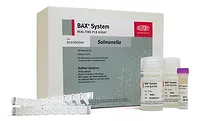BAX® System Real-Time PCR Assay for Salmonella Excels in Challenging Food Matrices

Polymerase chain reaction (PCR), a trusted molecular method in academia and industrial applications, has become a workhorse for food safety service labs and even in processing facilities to detect foodborne pathogens. Its popularity should be of no surprise: It’s accurate, fast, and easy to use.
PCR’s excellent performance has made it a valuable tool in the markets that have adopted it; however, not all instrumentation is alike, and the commercial assays that are available can vary in quality and design. Only a few commercial assays are truly capable of ruling out nontarget organisms and performing across a range of food matrices that can challenge molecular methods. Proving that capability eludes nearly all but a select group of commercial instruments and tests.
AFNOR Certification
The BAX® System Real-Time PCR Assay for Salmonella has been certified according to International Organization for Standardization (ISO) 16140-2 (which specifies the technical protocol for validating alternative methods of microbiological testing in the food chain) by AFNOR, a France-based European ISO certification organization that is widely recognized for the accreditation of food safety detection methods, for the ability to both detect Salmonella spp. in all human foods, including dairy (except powdered milk) and chocolate food categories, and to work with a shortened enrichment protocol for raw meats and seafood. This certification also includes pet food and production environmental samples (except primary production environment). The real-time Salmonella assay is one of 10 existing BAX system assays (for real-time and traditional endpoint PCR) to be certified by AFNOR.
Comparative Study Demonstrates Superior Performance
A study conducted by the Nestlé Research Centre and the Uni-versity of Zurich helps bolster the qualifications of the BAX system to deliver accurate results, even in difficult matrices. The comparative study evaluated seven commercial PCR assays for Salmonella with regards to inclusivity, exclusivity, and limits of detection. To determine the limits of detection, four food products known to cause PCR inhibition were inoculated at various levels and tested after enrichment with each assay. These matrices included skim milk powder, bouillon powder with Mediterranean herbs, black tea, and cocoa powder.
The inclusivity and exclusivity results showed that the BAX system was one of three real-time Salmonella PCR kits that could not only correctly identify 49 Salmonella strains (from 39 serotypes) but also rule out 29 non-Salmonella strains. The remaining four systems had false positive rates of 3.1 to 15.6 percent. Even a small false-positive rate can mean that invaluable time, labor, and other resources (including halting a food supply line) can be wasted in an effort to eradicate a nonexistent pathogen.
Data from Difficult Matrices
While all methods compared returned similar values for the limit of detection in milk powder and bouillon powder, the BAX system demonstrated a limit of detection of less than one colony-forming unit of Salmonella in 25 g of black tea and cocoa powder without inhibition. These two food matrices mainly contain polyphenols, known to be inhibitory for PCR.
Certain matrices are considered difficult because they can contain food constituents or environmental compounds that inhibit PCR. Such inhibition is a common reason for PCR failure, assuming an adequate number of DNA copies are present.
The BAX system has features such as internal amplification controls that can verify that inhibition did not occur, which other RT-PCR systems may lack. In addition, it can detect Escherichia coli O157:H7 specifically (not a range of non-H7 strains), reducing the potential for the false identification of H7.
Conclusion
The BAX System Real-Time Salmonella Assay has been shown to accurately detect Salmonella spp., even in matrices that contain inhibitory compounds as tested in this third-party-led study. Many of these substances are naturally pres-ent in foods and can negatively impact PCR results. Therefore, choosing the right assay that can identify pathogens in a variety of matrix types is essential for maintaining microbiological standards for the food industry.
Looking for quick answers on food safety topics?
Try Ask FSM, our new smart AI search tool.
Ask FSM →








